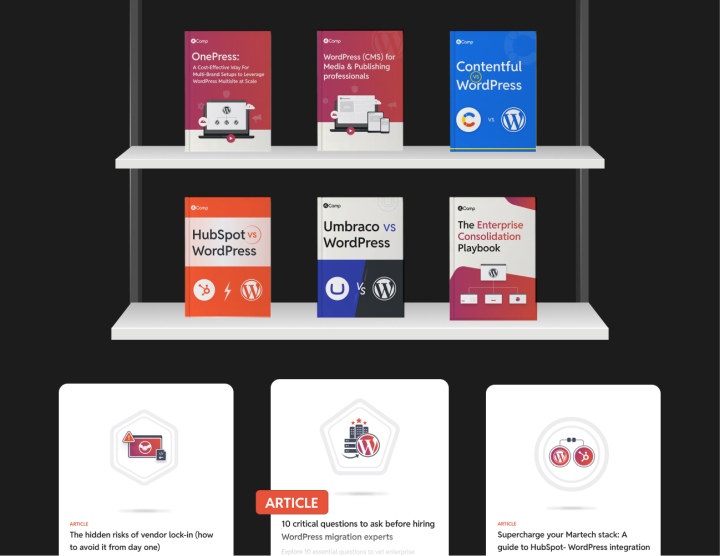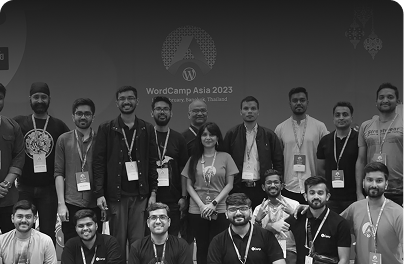WordPress staff augmentation: What roles do we offer
At rtCamp, we offer a range of roles and expertise as part of our staff augmentation services. Whether you need software engineers to execute development tasks, lead engineers to architect large-scale WordPress ecosystems, or project managers to ensure end-to-end execution, we’ve got the resources to cover.
Let’s take a look at the roles we offer and the key responsibilities they take on when onboarding client projects. These are just for reference, actual responsibilities vary based on the project, engagement scope, and business needs.
Lead Software Engineers: Driving strategic execution
Our Lead Software Engineers bring deep technical expertise and enterprise-focused problem-solving, helping organizations scale their WordPress platforms effectively. Depending on your needs, they can take ownership of:
- Planning and executing CMS migrations from proprietary platforms like Sitecore, AEM, and Drupal to WordPress, ensuring complete functional parity.
- Architecting and optimizing multisite WordPress networks for enterprises managing regional, multilingual, or multibrand websites.
- Implementing enterprise-grade security with compliance measures for GDPR, HIPAA, and SOC 2.
- Building headless WordPress solutions with React, GraphQL, and modern frontend frameworks to decouple content management and presentation layers.
- Overseeing DevOps strategies, including CI/CD pipeline automation, containerization, and scalable cloud hosting tailored for high-traffic WordPress deployments.
Senior Software Engineers: Bringing technical leadership
Our Senior Software Engineers ensure code quality, security, and scalability, working closely with development teams to refine and optimize enterprise WordPress setups. Their contributions include:
- Developing high-performance WordPress plugins and custom functionality to meet enterprise-specific requirements.
- Optimizing caching strategies to enhance page load speeds and reduce infrastructure costs.
- Integrating WordPress with enterprise tools like CDNs, ERPs, and DAMs. Also with custom business applications.
- Conducting in-depth code reviews and performance audits, ensuring best practices across large codebases.
- Implementing CI/CD pipelines for automated testing, deployments, and staging environment management.
Software/WordPress Engineers: Handling core development and technical execution
Our Software/WordPress Engineers handle the day-to-day execution of WordPress development tasks, ensuring enterprise projects stay on track and function at peak efficiency. Their work includes:
- Independently building and extending custom Gutenberg blocks to improve editorial workflows and content flexibility.
- Developing and maintaining custom WordPress themes and integrations to align with brand guidelines and UX expectations.
- Customizing plugins and developing and maintaining custom ones for adding desired functionalities.
- Fixing critical bugs and troubleshooting plugin conflicts, ensuring system stability and uptime.
- Optimizing frontend performance through asset minification, lazy loading, and eliminating render-blocking resources.
- Assisting with structured content migrations, ensuring seamless imports from legacy CMS platforms.
Frontend Engineers: Building frontend experiences
Our Frontend Engineers specialize in building modern, performant user interfaces for enterprise WordPress sites. Their key contributions include:
- Creating pixel-perfect, responsive WordPress themes using modern frontend frameworks and performance-optimized CSS/JavaScript.
- Building interactive user experiences with JavaScript frameworks such as React and Vue.js, seamlessly integrated with WordPress.
- Enhancing site performance through efficient asset loading, lazy loading, and reducing Time to First Byte (TTFB).
- Ensuring accessibility compliance (WCAG) across all UI elements, improving usability for global audiences.
- Collaborating with backend engineers to refine REST API and GraphQL integrations, ensuring a smooth exchange of data between frontend and backend.
Backend Engineers: Powering the backend infrastructure
Our Backend Engineers ensure that WordPress sites run efficiently at scale, handling everything from API integrations to database optimizations. Their focus areas include:
- Building and maintaining REST API and GraphQL endpoints, enabling seamless WordPress integrations with third-party systems.
- Developing custom WordPress plugins and extending core functionalities to support enterprise workflows.
- Implementing advanced security measures, including data encryption, role-based access control (RBAC), and automated vulnerability patching.
- Optimizing database queries to ensure high performance, even on content-heavy, high-traffic WordPress sites.
- Managing DevOps workflows, automating deployments, backups, and server performance tuning.
Full-Stack Engineers: Bridging frontend and backend development
Our Full-Stack Engineers are equipped to handle both frontend and backend tasks, making them invaluable for end-to-end WordPress development. Their expertise includes:
- Building custom Gutenberg blocks and JavaScript-powered frontends that interact with WordPress REST API and GraphQL.
- Creating scalable WordPress themes and plugins, ensuring seamless integration with enterprise infrastructure.
- Developing high-performance headless WordPress architectures that combine WordPress with modern JavaScript frameworks.
- Writing efficient PHP code while implementing React, Vue.js, or Alpine.js for dynamic frontend elements.
- Optimizing performance, improving query efficiency, asset loading strategies, and Core Web Vitals to meet enterprise-scale demands.
Senior Quality Analysts: Ensuring stability, security, and compliance
Our Senior QAs are responsible for maintaining quality assurance standards in WordPress development, helping enterprises deploy bug-free, high-performing websites. They focus on:
- Developing and automating test suites using test automation solutions.
- Conducting regression testing to ensure WordPress updates don’t introduce conflicts or break functionality.
- End-to-end testing with real user flows and ensuring that key business functions (checkout flows, form submissions, integrations) work flawlessly.
- Ensuring accessibility (WCAG) and security compliance, aligning WordPress implementations with enterprise requirements.
- Testing performance optimizations, monitoring site speed, and validating caching and CDN strategies.
- Database integrity and migration testing to verify seamless content migrations, backups, and restores in WordPress environments.
- Security testing and vulnerability assessments to identify threats, ensuring compliance with enterprise security policies.
- Establishing QA best practices, integrating automated testing into CI/CD pipelines to catch issues early and improve deployment reliability.
Project Managers: Driving project execution
Our Project Managers ensure that WordPress development stays on track, aligning technical work with business goals. They oversee:
- Agile development workflows, ensuring timely deliverables while adapting to project needs.
- Sprint planning, backlog management, and stakeholder communication, ensuring full transparency.
- Resource allocation and workload balancing, optimizing developer efficiency across enterprise projects.
- Risk management and troubleshooting, proactively addressing bottlenecks before they impact deadlines.
- Process optimization and continuous improvement, refining workflows to enhance productivity and streamline collaboration between engineering, design, and business teams.
Beyond these roles: Custom engineering solutions
If your enterprise requires specialized WordPress expertise, we can custom-hire and train engineers to align with your technology stack, compliance needs, and workflow requirements.







